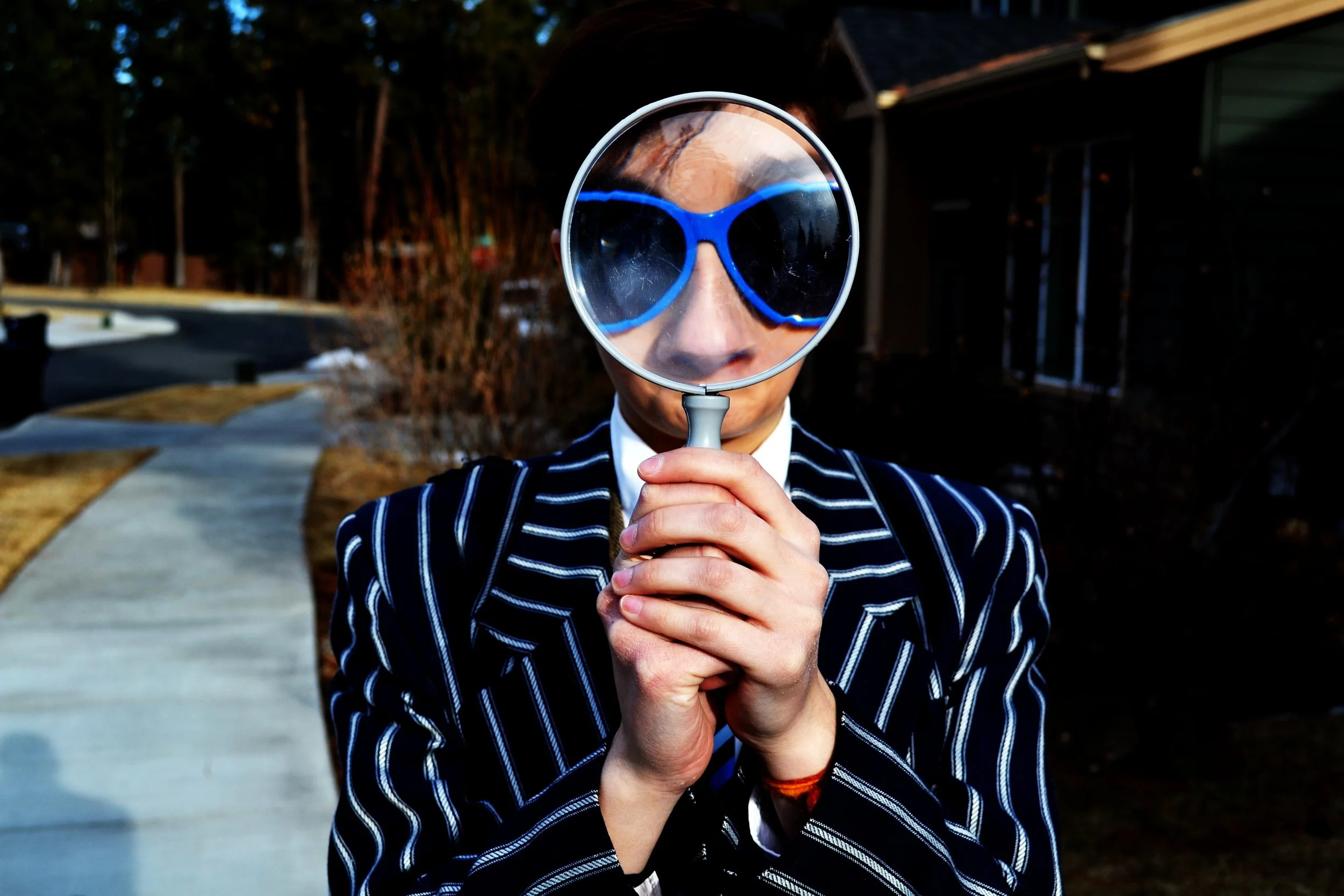Why saying "I don't see colour" is a little bit racist
Anti-Racism is a Journey
If you've ever heard someone say, 'I don't see colour', or you think you may have said something along those lines, and you're not sure why it’s a little bit racisty, this is for you.
First of all, it’s important to note that we're all always learning in this process of creating a more just and equitable world, and no one is able to take a position of higher moral ground and presume they are “all-knowing”. We all have different levels of understanding and awareness; some are new to these conversations, others are expert educators on the subject matter, but we’re all still learning.
The lived experience of Culturally and Racially Marginalised (CARM) people will no longer be diminished or dismissed by fragility or umbrance, but we, too, are all still learning how to decolonise our own thoughts and actions and advocate more effectively for justice, equity and inclusion.
The number of colleagues, allies, advocates, and even other DE&I facilitators who have reached out to me for guidance on how to effectively facilitate a conversation around the inappropriateness of the phrase “I don’t see colour” tells me that we are ALL still learning.
And if PoC Anti-Racism trainers can say they're still learning, then consider how ridiculous it would sound for an ally to take offence at being corrected or compassionately educated.
Allies, please know that you will most definitely continue to make mistakes in this learning process, and it's really important not to be precious about that. It is essential not to take offence or become defensive when corrected or lovingly assisted on this learning journey. To think that you won't make any mistakes with the use of outdated language or unchallenged assumptions is to assume that you know all there is to know on the subject of racism. That would be completely disrespectful of the irreplaceable value of lived experience. With that said, let's get into the topic of - "I Don't See Colour"
Dissecting How We Talk About Race
To analyse this phrase and understand the impact it has both on individuals and on society, I have decided to analyse it in four parts, as shown below.
How does this phrase come across?
What function does it serve in a conversation?
How does this phrase serve the person saying it?
What is the long-term impact of these words?
Each one of these points can be elaborated into infinitum, but I will be brief with this particular analysis and offer further articles to explain specific points in greater depth at a later stage.
How does “I Don’t See Colour” come across?
Well, the truth is, we all see colour, including people of colour. "I don't see colour" is not something someone who is racially marginalised ever says. As much as we all aspire to the ideal of ‘The Oneness of Humanity' and work towards creating social cohesion and unity, that's not what this phrase is saying; consider how it's only ever people who identify as 'White' who say this particular phrase in this specific way?
Let us consider how in India and other parts of the world, skin bleaching cream is used in an attempt to feel more socially accepted; African-American grandmothers will sometimes speak of how they worry more for certain grandchildren than others knowing they're at higher risk of police violence due to the complexion of their skin; minority groups in any settler-colonial society will be fully cognisant of the other minority groups and conscious of what differences exist between their respective experiences; (we all see and acknowledge 'the gradient').
Further to the fact that 'race' or 'colour' and even the gradient of colour is a very real part of the daily lives of billions of people, research has even shown that even being literally blind is still not a barrier to recognising differences in race and culture. People who cannot see with their eyes are still able to acknowledge and understand variance in culture from non-visual keys.
Not only is there sufficient evidence to suggest that recognising 'race' or 'colour' does not require eyesight, but further to that, the idea of being 'not prejudiced' is debunked by the vast body of research that speaks of unconscious racial bias in adults and children alike, and even with children of colour towards people of colour. To learn more about that, see #SystemicRacism or #InternalisedRacism.
So it becomes clear that the sentiment of not seeing colour is not just a lie but a scientifically proven impossibility. But further to that, it is offensive and contrary to a person's lived existence; the statement tries to deny a person's very real and tangible physical existence, their appearance, their cultural heritage, their reality and distinctness; something that all people should all be able to acknowledge, assert, and share openly with joy and confidence.
Even more deeply damaging than the denial of a person's physical distinctness and cultural heritage is the dismissiveness and insensitivity around the lived experience of all people who have been subjected to systemic racism in a society that has disadvantaged them at every conceivable level and in every possible way.
This statement of not seeing race or colour may seem as though it is benign, innocent and well-meaning, but it's actually just another attempt at the erasure of cultural heritage and diversity, a mechanism that the colonial project employed with such devastating repercussions that Indigenous people all over the world are still reeling from its effects.
It's not too hard to understand how the erasure of culture, language, diversity and uniqueness can come across as offensive and insensitive; I assume everyone reading this is familiar with the whole colonialism, slavery, White Australia policy thing, yeah?
After five hundred years of cultural genocide, it would be great if there were no more attempts at acculturation and assimilation for the comfort of Anglo-Cetic and European settlers.
*NOTE* Offering the above explanation to someone who says they "don't see colour" will sometimes trigger them into saying something along the lines of: "but that's not what I mean", or "you're misunderstanding my words", or "that wasn't my intention"; it's usually the response we get in everyday conversations and workshops.
And this is when we can look into the concept of “denial of harm” or victim-blaming for further clarification. The propensity for deciding not to listen to someone who has been harmed and insisting that intention is more important than the outcome is a common character trait in unjust power dynamics. We will elaborate on this theme at a later date.
But for now, we will continue with this discourse analysis and look into what function the phrase serves in the context it is being used.
The function of Colourblindness in a conversation.
If we look at the words in the context that they are used, we see that they don't usually just pop up in a vacuum but rather when the topic of racial justice is being discussed. And unfortunately, it isn’t usually used to admonish an openly racist person by explaining that all people are equal and should be treated with respect and love. Unfortunately, the context in which it usually comes up, and the context within which we are unpacking it, is that of a conversation with other Allies and People of Colour about racism and racial justice, and someone interjects to claim they are immune to the systemic influences of prejudice and bias.
A person saying that they don't see race or colour in a conversation about race relations and racial justice is not the same as a bumper sticker that reads "Humanity is One" or a t-shirt that proclaims "There's Only One Race, The Human Race"; correct? That's not what we're talking about here.
Much like the case of the statement 'All Lives Matter' being technically correct, but when spoken as a response to 'Black Lives Matter,' it becomes a retort and dismissal and not a proclamation of universal oneness. This instance is another example of context changing the subtext.
The examples of "Humanity is One" or "There Is Only One Race" are both proactive and standalone statements that act to create a positive impact on society and lead to unity, oneness and togetherness. They are statements we put out into the world outside of the context of a conversation about systemic racism, and they have a productive outcome as a standalone sentiment.
When used as a retort or defensive response, in the context of a conversation about racial justice and systemic racism, the phrase "I don't see colour" serves a very different function... it is not harmless or benign, and it definitely is not productive.
Let us consider, “what does it actually DO at that moment”. What function does it serve? What is the effect it has on the flow and dynamics of conversation?
It acts to derail the conversation...
It is not a comment that furthers the discussion on how to address racism in society but stifles it instead. And behind that intention of derailment, we see how it acts as a defensive deflection mechanism for the person saying it.
But why would a friend or ally ever want to derail the conversation, you ask? Well, because it's a round-about way for them to say, "I'm not racist", or "I'm progressive, and that doesn’t apply to me", or "I'm not at fault here" or even "can we move on from this conversation, because I'm not comfortable discussing the disadvantages and injustice that you have had to overcome to get yourself to this point in your life".
And though all of the above may be perfectly true, it is all entirely beside the point and not at all helpful. Further to that, it is slightly narcissistic when you consider that in response to "Let's discuss systemic racism," a person would say, "I'm not racist" or "I'm not at fault here", as if their personal 'progressiveness' outweighs the lived experience of racism for billions of other people.
It is really straightforward to understand how all words spoken have an underlying purpose or intention in their expression. That is what a Discourse Analysis seeks to understand; what's actually being said here?
Subconsciously we are all aware of the underlying purpose of our sentences when we speak. To communicate effectively and comprehend clearly, we should decipher the meaning and respond appropriately to the subtext. Failing to do so leads to miscommunication, misunderstanding and confusion.
How does Colourblindness serve the person claiming it?
So now that we have recognised that the underlying function of the statement "I don't see colour" or "I don't see race" is to derail the conversation, we are left with the next question; why would a person feel the need to derail the conversation when they are themselves 'not racist'?
Why would someone feel the need to express that they are 'not at fault' or that they are progressive and open-minded when in the middle of a conversation about systemic racism?
Why would a person share that they don't “see colour” when discussing the historical and current injustices faced by Indigenous populations or African-Americans or the treatment of people seeking asylum? What is the point of this derailment?
Well, because it's an inherently uncomfortable conversation to have as it shines a light on things we would rather not have to look at too closely, a derailment is an act of self-preservation, not of one's life, but the preservation of a person’s emotional comfort. The truth is we know, consciously or unconsciously, that failing to engage with issues of racial justice is neglectful, and our inaction in the past is what contributes to our shame in the present moment. The derailment of the conversation by asserting one's innocence or blindness to colour relieves us of that uncomfortable feeling that comes up when discussing racism. This derailment and deflection allows people to feel OK about their lack of engagement with an issue in the past or the present, or it tries to claim immunity through some type of “proximity”
This sentiment of not seeing race or colour doesn't just work to dissolve and remove the discomfort and squeamishness that comes up, but more damaging than that, it's an attempt to absolve any need to act or relieve any moral obligation to engage.
This attempt to assert one’s "progressiveness" along with other examples like anecdotal evidence of proximity to colour, such as nieces and nephews or friends and colleagues, or some unnamed 'Indigenous Elder' they once met, or a one-month volunteering trip to Bangladesh, are all broadly referred to as Virtue-Signalling.
Virtue-signalling can range from naive attempts to form a connection or establish some sort of 'credentials', or it can be damaging and destructive statements like "I don't see colour" that derail and deflect.
What is the impact of the sentiment “I Don’t See Colour”?
Let's consider this same type of sentiment as expressed in a very different but parallel context; the movement for Gender Equality. Imagine you're in the middle of a conversation around the wage gap or gendered violence, or patriarchal control of the female body etc.
If a man were to walk into the room and say in that context, "I just don't see gender", or "I treat everyone the same", how naive, narcissistic and tone-deaf does that sound?
Even though this person does not see the deep gender inequality in our society, or even if their 'personal values' advocate for equality and equal opportunity, it doesn't negate the reality and lived experience of gender inequality. It is not a respectful or intelligent thing to say in that context.
So let's apply that same logic to racial discrimination.
These types of dismissals are not only offensive and insensitive, but they are also counter-productive and oppressive. One could argue (and many have) that this is, in fact, very much intentional.
In short and simple terms, "I don't see colour" dismisses the reality of a person's physical existence, denies their lived experience of racism, derails the conversation on racial justice, and deflects our responsibility to undo systemic racism.
Though technically, it is not a 'racist' thing to say, there are many ways in which it supports, condones and perpetuates racism. The phrase "I don't see colour" is insensitive and dismissive of cultural diversity and the nuances of our existences; it is wise to remember that though the construct of 'race' is not real, the concept of culture still very much is...
It is also naive and narcissistic in that it wishes to ignore the lived experience of billions while establishing one's moral high ground and 'progressiveness' as a response to the injustices faced by others.
But worst of all, it is destructive and counter-productive in that it allows systemic racism to continue by virtue of the fact that it derails the conversation and stifles the possibility of progress and change.
The belief that it absolves moral obligation is false; it does not. The idea that it helps to establish trust or comradery with people of colour is again wrong; it raises alarm bells. The premise that it is a progressive and open-minded way to see the world is also misguided; it is obvious that it is in retort and not in support of the movement for racial justice. And finally, the assumption that it is benign or innocent can also be dismissed once we understand all the damage and hurt that is done.
Saying "I don't see colour" does not make someone a bad person; it just means that there were misunderstandings that needed to be clarified. Having resorted to saying these words in a conversation about racism does not make a person a monster; it just means they felt threatened and insecure. Using this statement as a way to deflect shame and deny involvement does not make a person racist per se. Still, it does allow racism to continue in society.
So, there you have it. An explanation of why we should not express that sentiment in that particular way and enough analysis to help us explain to our friends and family why they should avoid that phrase and deeply reflect on where the sentiment is coming from.
We might not have created racism, but we certainly are responsible for dismantling it. And even if dismantling it is too much to ask of some of our friends and family, at the very least, we can lovingly explain to them how they can ensure they no longer support or perpetuate it.


